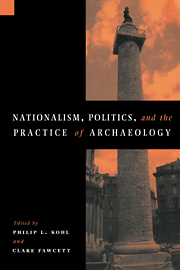Book contents
- Frontmatter
- Contents
- List of maps
- List of contributors
- Acknowledgments
- Part I Introduction
- Part II Western Europe
- Part III Eastern Europe and Eurasia
- Part IV East Asia
- Part V Commentary
- 15 Promised lands and chosen peoples: the politics and poetics of archaeological narrative
- 16 Romanticism, nationalism, and archaeology
- Bibliography
- Index
16 - Romanticism, nationalism, and archaeology
Published online by Cambridge University Press: 06 October 2009
- Frontmatter
- Contents
- List of maps
- List of contributors
- Acknowledgments
- Part I Introduction
- Part II Western Europe
- Part III Eastern Europe and Eurasia
- Part IV East Asia
- Part V Commentary
- 15 Promised lands and chosen peoples: the politics and poetics of archaeological narrative
- 16 Romanticism, nationalism, and archaeology
- Bibliography
- Index
Summary
European thought has been dominated for over 200 years by a pervasive dichotomy between rationalism, universalism, and positivism on the one hand and romanticism, particularism (or “alterity”), and idealism on the other. The first of these philosophical packages was initially associated with French liberalism, the second with German reaction (Dumont 1991). Both ethnic nationalism and post-modernism (which in archaeology is the essence of post-processualism) are products of the romantic side of this polarity.
Archaeology, idealism, and relativism
Post-processualism remains a minority position in archaeology, but derives considerable prestige from the preeminence of post-modernism in comparative literature and its dissemination throughout the humanities and social sciences (Hunt 1989; Laudan 1990; Rose 1991). Post-processualism propagates the idea that, because every decoding of a message is another encoding, all truth is subjective (Tilley 1990:338). It thereby transforms relativism into an absolute principle. Because of this, many post-processualists conclude that there is no difference between knowledge and faith and further deny the validity of distinguishing science from magic and religion (Barnes 1974, 1977). Archaeologists such as Shanks and Tilley have concluded that the only goal of their research can be a political one (Shanks and Tilley 1987a:195). In their view, the aim of archaeological discourse should be to disempower political and intellectual elites by affirming the relativism, and hence the equal validity, of all explanations of the past (Bapty and Yates 1990; Shanks 1992; Shanks and Tilley 1987a, 1987b, 1989; Tilley 1990, 1991; Ucko 1990).
- Type
- Chapter
- Information
- Nationalism, Politics and the Practice of Archaeology , pp. 263 - 279Publisher: Cambridge University PressPrint publication year: 1996
- 16
- Cited by



